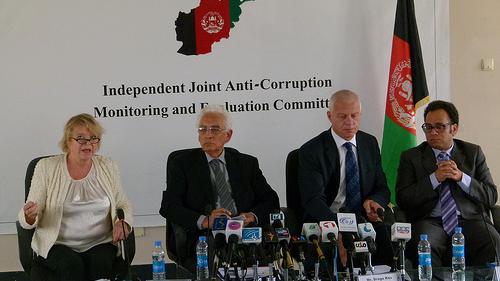KABUL - A United Nations-backed high-level anti-corruption body today urged the Afghan institution organizing next year’s Presidential elections, as well as Afghan authorities, to develop regulations and proper monitoring mechanisms for the campaign financing of presidential candidates.“Afghan laws have allowed presidential candidates to spend up to 10 million Afghanis (approx. $175,000) for their election campaigning,” said a member of the Independent Joint Anti-Corruption Monitoring and Evaluation Committee (MEC), Yama Torabi, at a news conference in the Afghan capital of Kabul.
“It needs a proper monitoring mechanism to make sure that none of the candidates exceed this limit,” added Mr. Torabi.
Afghanistan is slated to hold Presidential and Provincial Council elections on 5 April next year. The Independent Election Commission of Afghanistan (IEC) is responsible for their organization.
UN officials have previously described next year’s elections as critical to the country’s future stability and continued international support. Next year’s Presidential elections will mark Afghanistan’s first ever transfer of power from one elected president to another.
Following an MEC review of Afghanistan’s electoral laws and the IEC’s strategic plan, Mr. Torabi said that the anti-graft body found “monitoring gaps in campaign financing of candidates that create opportunities for corruption and fraud, including the misuse of official positions and government resources.”
Independent from the Afghan Government and the international community, the MEC was created after the need for the independent monitoring and evaluation of anti-corruption efforts was identified at international conferences on Afghanistan. Following the London Conference in January 2010 and the Kabul Conference seven months later, the Afghan Government invited the international community to form a joint Afghan-international monitoring and evaluation committee.
The six-member MEC has three senior anti-corruption experts appointed on Afghan Government’s recommendation, and three others on the recommendation of the United Nations, on behalf of the international community.
In his comments, Mr. Torabi said there was a need for the IEC and Afghanistan’s Ministry of Finance to register and verify all income sources of political parties and presidential candidates, as well as their assets, in cooperation with the High Office of Oversight and Anti-Corruption, an Afghan body created in 2008 in accordance with the United Nations Convention against Corruption in order to oversee and coordinate the implementation of the anti-corruption efforts.
In a news release issued separately today, the MEC noted that the past presidential elections faced allegations of widespread ballot stuffing, intimidation and other electoral fraud.
“Although the IEC has initiated a fraud mitigation strategy, it needs to enhance the training and monitoring of polling station staff to mitigate against past abuses,” the anti-graft body said.
The MEC has asked the IEC to ensure that polling officials are properly trained to mitigate fraudulent activities noted in the past elections.
Related article:
- UN-backed anti-graft body says more needs to be done to fight corruption in Afghanistan






